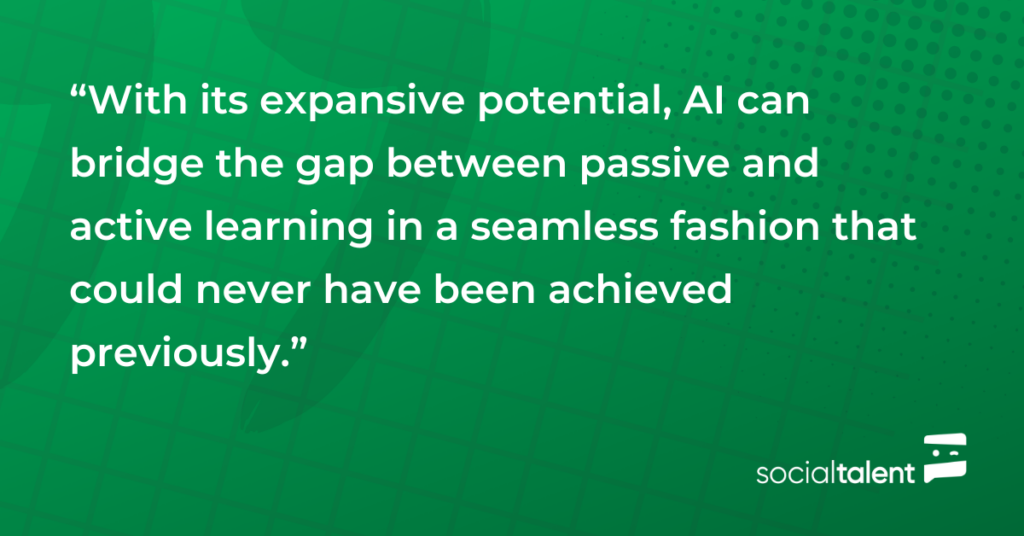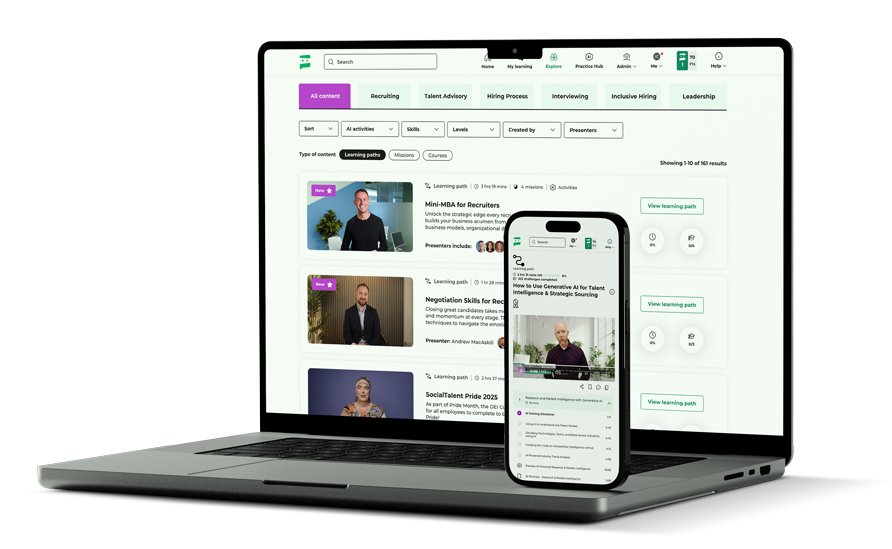
By David Deady
Learning and development has cemented itself as a pivotal component of any thriving workforce. According to LinkedIn, over 90% of orgainzations include a digital L&D experience of some description in their offering. It is something that both employees and employers alike derive huge benefits from; having an active and effective culture of learning inspires innovation, aids in upskilling, acts as a talent magnet, and can keep engagement levels soaring.
But so much of its success relies on the quality of the product and content being employed to facilitate this learning. As L&D in the workplace has evolved over the years, it feels like we’re on the precipice of the next iteration. The advent of AI and its mainstream proliferation has afforded a new opportunity to make learning more actionable, engaging, and practical.
Research consistently shows that experiential learning – where individuals actively perform tasks and gain hands-on experience – is the most effective way to train. The current staple for this involves things like quizzes or learning groups, which have their important benefits in the learning ecosystem. But AI can bring this to a whole new level.
Let’s dig into it.

The AI Learning Experience
According to a report in the Computers and Education: Artificial Intelligence journal:
“Simulation-based learning – as an active and immersive experience that can re-create a realistic and authentic real-life event or set of learning situations to solve a problem – can afford a cost-effective, authentic learning experience that facilitates deeper learning, inquiry, and problem-solving.”
With its expansive potential, AI can bridge the gap between passive and active learning in a seamless fashion that could never have been achieved previously. While it’s true that artificial intelligence’s role in L&D is at an early stage, it is positioned to create a significant impact and when leveraged thoughtfully, will undoubtedly be the next big game-changer in this industry.
But how can AI and simulation be used to augment workplace learning?
1. Enhancing Coaching and Feedback Skills
AI-driven simulations are particularly effective for developing coaching and feedback skills among leaders in any role. Leadership, after all, is not just about making decisions but about guiding others to make decisions and grow in their roles. Traditional methods of leadership training, often centered around theoretical models or case studies, have their place, but they lack the dynamic and immersive experiences that AI can offer.
AI-powered simulations provide a safe and controlled environment where users can practice critical conversations, explore the nuances of delivering feedback, and test out different coaching techniques. These simulations can replicate real-world challenges, such as managing a team through a crisis or giving constructive criticism to a struggling employee. Because the scenarios are lifelike, leaders gain practical experience that is directly transferable to their everyday roles.
As Nadia Faisal states in her paper published in the Human Behaviors and Emerging Technologies journal:
“In addition to encouraging higher engagement levels, simulations in the business context can improve soft skills such as teamwork, decision-making, leadership, and other technical skills used in strategic management.”
When learners are engaged, they are more likely to absorb the material and retain the information. The interactive, game-like environment encourages social interaction, which is vital for learning. Leaders can see firsthand the effects of their decisions and receive immediate feedback, which is a key aspect of the learning process.
2. Simulation-Based Training
Simulation training is a cornerstone of experiential learning, allowing individuals to apply their knowledge in a controlled setting that mirrors real-world scenarios. This method has proven to be highly effective, boosting retention rates over traditional training methods that often rely on rote memorization or passive learning.
AI enhances simulation training by creating scenarios that are not just realistic but also complex and dynamic. In high-stakes industries such as healthcare, finance, or aviation, decision-making under pressure is a crucial skill. AI can simulate these environments, allowing learners to practice and refine their skills in a risk-free setting. Let’s take the finance sector for example; AI can simulate market fluctuations, enabling traders to hone their strategies in response to different economic conditions. Or what about interviewing training for recruiters and hiring managers? AI simulation mirrors and replicates the interview situation allowing panelists to actively test their skills and questioning.

3. Allowing for Feedback and Adaptive Learning
One of the most significant advantages of AI in role-playing simulations is its ability to provide immediate feedback. In traditional training methods, feedback is often delayed (or non-existent), which can reduce its effectiveness. However, AI can analyze a learner’s performance in real-time, offering instant assessments that allow for on-the-spot adjustments.
This immediate feedback loop is invaluable. It fosters a more dynamic and responsive learning environment where learners can correct mistakes and improve their skills as they go. This approach not only accelerates the learning process but also enhances retention, as learners can immediately see the consequences of their actions and make the necessary corrections. And given that 65% of employees want more feedback from their learning and development, this is a crucial component.
Moreover, AI-powered simulations are capable of adaptive learning. This means that the training can be tailored to the individual learner’s needs, adjusting the difficulty level based on their progress. If a learner is struggling with a particular aspect of the training, the AI can provide additional resources or modify the scenario to focus on that area, ensuring that the learner masters the skills before moving on to more advanced topics.
4. Repeated Practice and Skill Reinforcement
AI simulations also offer the opportunity for repeated practice, which is essential for long-term skill retention. In a traditional training setting, learners might only have one or two chances to practice a skill, which can limit their ability to fully internalize it. However, with AI-driven simulations, learners can revisit scenarios as many times as needed to reinforce their abilities. As Aristotle himself remarked:
“It is frequent repetition that produces a natural tendency.”
This repeated exposure helps build muscle memory and enhances decision-making skills. Over time, learners become more confident and competent, as they have had the chance to refine their techniques and learn from their mistakes in a safe environment. Studies have shown that consistent practice in simulated settings leads to long-term retention of skills, which is crucial for maintaining high performance levels in the workplace.
Where Do We Go From Here?
As HBR states, AI “can create highly realistic, varied training simulations that respond dynamically to user decisions.”
It’s this level of personalization and engagement that makes these advancements so exciting. As AI continues to evolve and integrate into various aspects of our lives, its potential to revolutionize learning and development becomes increasingly apparent. AI-driven simulations offer a powerful and effective way to enhance experiential learning, providing realistic scenarios, immediate feedback, and the opportunity for repeated practice.
In the future, as AI technology continues to advance, we can expect to see even more innovative applications in the realm of L&D. The potential for AI to personalize learning experiences, simulate increasingly complex scenarios, and provide real-time support will undoubtedly shape the future of workforce training.
SocialTalent has been in the learning and development game for over a decade now and we’re constantly looking for ways to iterate and improve how we deliver our training. And AI absolutely represents a new and intriguing horizon for us.
All we can say for now is, watch this space…


